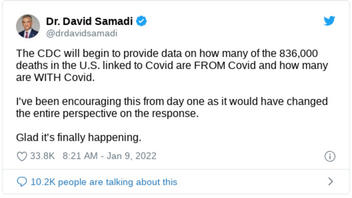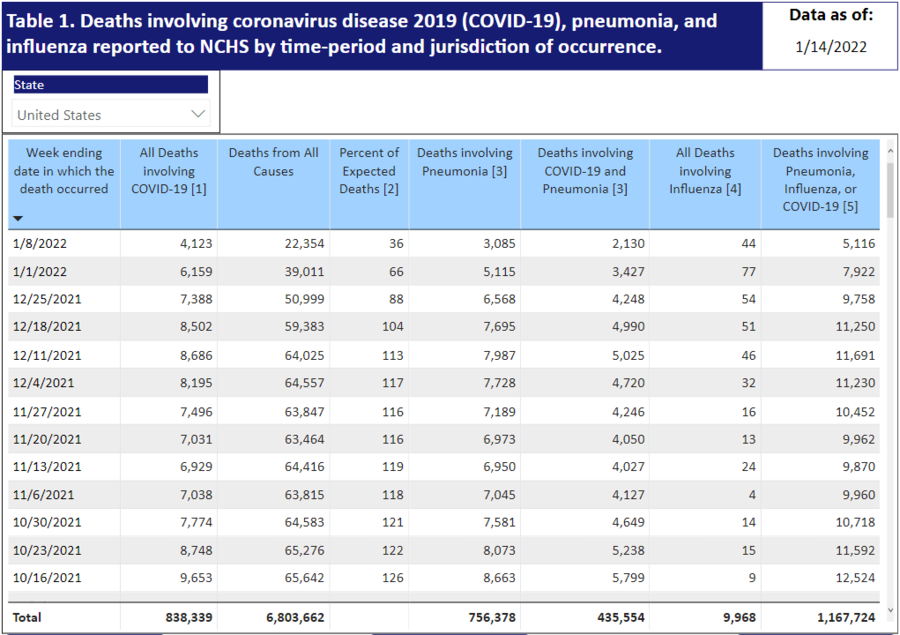
Will the Centers for Disease Control and Prevention (CDC) newly begin in January 2022 to provide data on how many U.S. deaths are "from" COVID and how many are "with" COVID? No, that's not true: The National Center for Health Statistics (NCHS) at the CDC has always separated out cases where COVID-19 was the immediate cause of death. The person may have had other conditions, but a physician or pathologist determined they would have still been alive if not for the virus.
The claim appeared in a Twitter post (archived here) by Dr. David Samadi on January 9, 2022. It says:
The CDC will begin to provide data on how many of the 836,000 deaths in the U.S. linked to Covid are FROM Covid and how many are WITH Covid.
I've been encouraging this from day one as it would have changed the entire perspective on the response.
Glad it's finally happening.
This is what the post looked like on Twitter at the time of writing:
(Source: Twitter screenshot taken on Fri Jan 14 18:10:07 2022 UTC)
Samadi's comments follow a "Fox News Sunday" interview on January 9, 2022, with Dr. Rochelle Walensky, director of the CDC. Here's her exchange with host Brett Baier:
Baier: Do you know how many of the 836,000 deaths in the U.S. linked to COVID are from COVID or how many are with COVID, but they had other comorbidities. Do you have that breakdown?
Walensky: Yes, of course, with omicron, we are following that very carefully. Our death registry, of course, takes a few weeks to ... collect, and of course, omicron has just been with us for a few weeks. But those data will be forthcoming.
While the Fox host asked a broad question about COVID death figures, Walensky answered a very specific question on the omicron variant, which was identified in South Africa on November 24, 2021. Groups that believe COVID death numbers are inflated pounced on her response as an answer to the broader query, suggesting the CDC had not differentiated between those who died "from" the virus and those who died "with" it. When Walenksy said, "those data will be forthcoming," she was referring to the normal delay in reporting deaths to the NCHS. The more recent the cases, the less complete the information is. This is how the CDC website explains it:
Number of deaths ... are the total number of deaths received and coded as of the date of analysis and may not represent all deaths that occurred in that period. Counts of deaths occurring before or after the reporting period are not included ... Data during recent periods are incomplete because of the lag in time between when the death occurred and when the death certificate is completed, submitted to NCHS and processed for reporting purposes. This delay can range from 1 week to 8 weeks or more, depending on the jurisdiction and cause of death.
The CDC has always counted COVID deaths as cases where COVID-19 was the immediate cause of death. In Table 1 below, there were 838,339 COVID deaths as of January 14, 2022. In addition, the table includes breakdowns for deaths involving influenza and pneumonia, or a combination of all three. It also includes "Deaths from All Causes":
(Source: CDC screenshot taken on Fri Jan 14 21:06:47 2022 UTC)
To be included as a COVID death, it must be billed under a specific diagnosis code (U07.1) as designated by the CDC:
Code only confirmed cases
Code only a confirmed diagnosis of the 2019 novel coronavirus disease (COVID-19) as documented by the provider, documentation of a positive COVID-19 test result, or a presumptive positive COVID-19 test result. For a confirmed diagnosis, assign code U07.1, COVID-19. This is an exception to the hospital inpatient guideline Section II, H. In this context, 'confirmation' does not require documentation of the type of test performed; the provider's documentation that the individual has COVID-19 is sufficient.
Presumptive positive COVID-19 test results should be coded as confirmed. A presumptive positive test result means an individual has tested positive for the virus at a local or state level, but it has not yet been confirmed by the Centers for Disease Control and Prevention (CDC). CDC confirmation of local and state tests for COVID-19 is no longer required.
HealthTeam Advantage insurance spells out the CDC guidelines on its website under "How/When to Bill U07.1 for COVID-19":
Examples of when to bill the U07.1 diagnosis:
- The patient has received a positive COVID-19 test result and is now being seen by a provider due to complications.
- The patient has recently received a positive COVID-19 test result and is admitted to the hospital due to COVID-19 complications.
- Presumptive positive COVID-19 test. A presumptive positive test result means an individual has tested positive for the virus at a local or state level, but it has not yet been confirmed by the CDC.
Ultimately, a physician or a board-certified forensic pathologist must determine the immediate cause of death and whether the primary cause was COVID-19. An August 31, 2020, Fact Check by Lead Stories explained the difference between dying "from" COVID or "with" COVID:
"Comorbidity" is not the same as cause of death
"Comorbidity" data has been collected since early in the pandemic. It's a scientific term that means the simultaneous presence of two chronic diseases or conditions in a patient, not two or more causes of death. The medical professional who signs a death certificate determines the immediate cause of death, but often notes other conditions the patient had at the time of death. Those are comorbidities.
Board-certified forensic pathologists are trained to determine the immediate cause of death, but often note co-existing and contributing factors, says Dr. Patricia A. Aronica, Florida District 19 medical examiner.
So, when a person who dies in a car crash also has COVID-19, the death certificate correctly declares the crash injuries as the cause of death. Conversely, when a person dies of the lung and organ failure that are the body's response to COVID-19 infection, the death certificate correctly attributes the death to COVID-19, even if the person was previously living with diabetes, heart disease or other conditions. "They would die with it, not because of it," said Aronica of the comorbidities.
Comorbidities are common. As many as 82 million Americans with employer-based insurance have a pre-existing condition, ranging from life-threatening illnesses like cancer to chronic conditions like diabetes, asthma, or heart disease, according to analysis by the Department of Health and Human Services. Some 50 million to 129 million (19% to 50% of) non-elderly Americans have some type of pre-existing health condition.



















